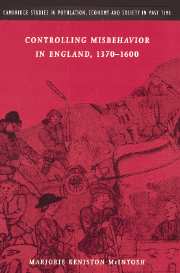Book contents
- Frontmatter
- Contents
- 1 List of illustrations
- 2 List of tables and lists
- Acknowledgements
- List of abbreviations
- Introduction
- Part I The history of social regulation
- Part II Factors that influenced social regulation
- Conclusion: social regulation and the transition from medieval to early modern England
- Appendices
- Bibliography
- Index
- Cambridge Studies in Population, Economy and Society in Past Time
Introduction
Published online by Cambridge University Press: 23 November 2009
- Frontmatter
- Contents
- 1 List of illustrations
- 2 List of tables and lists
- Acknowledgements
- List of abbreviations
- Introduction
- Part I The history of social regulation
- Part II Factors that influenced social regulation
- Conclusion: social regulation and the transition from medieval to early modern England
- Appendices
- Bibliography
- Index
- Cambridge Studies in Population, Economy and Society in Past Time
Summary
The debate over social regulation
During the decades around 1600, many English communities were deeply troubled by social misbehavior. In an attempt to maintain good order and enforce ethical conduct, local officials reported and punished sexual wrongdoing, excessive drinking, and the playing of illegal games, especially among the poor. Sometimes they addressed verbal abuse known as “scolding,” described as a characteristically female offence. If the campaign for reform was led by fervent Puritans, it might include an attack upon older traditions of popular culture as well – customary village recreations like morris dancing and seasonal rituals like May Day festivities. Efforts to contain misconduct were generally led by the male heads of well-established families of yeomen, the more prosperous craftsmen and traders, and occasionally some of the resident gentry. In addition to informal means of control, these men were able to employ the authority of the English legal system: they could include social wrongdoing among the problems they reported as jurors in their local courts, as lay parish officials in the church courts, or as local spokesmen summoned before county Sessions of the Peace. The punishments imposed upon offenders (a monetary fine, some form of public confinement cum ridicule, whipping, open confession of error, or religious excommunication) depended upon the nature of their offence and the type of court.
While historians agree that anxiety about misbehavior was widespread around 1600, the reasons for concern are not fully understood. One explanation suggests that attempts at “a reformation of manners” were influenced in some communities by the Puritan ideology of “the middling sort” who dominated local offices.
- Type
- Chapter
- Information
- Controlling Misbehavior in England, 1370–1600 , pp. 1 - 20Publisher: Cambridge University PressPrint publication year: 1998

